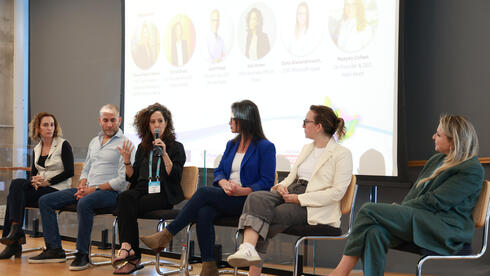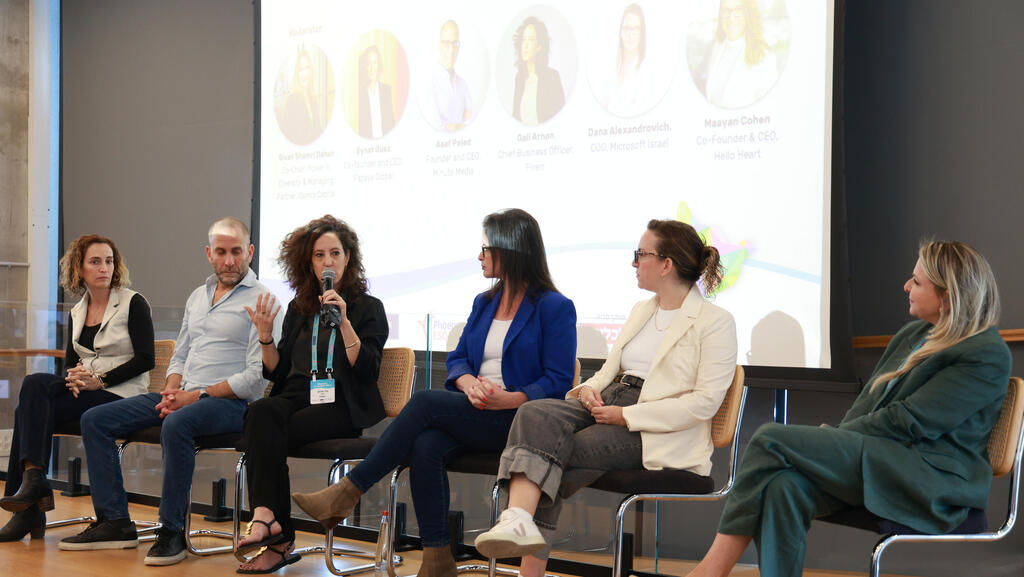
"On October 7, we realized that we are Israelis first and mobilized to help, no matter what our political views were before"
Eynat Guez, CEO of Papaya Global, was speaking at the Power in Diversity conference held at Microsoft's offices in Tel Aviv; she also added, "As an Israeli company, our social agenda is just as important as our business agenda."
"On October 7, we realized that we are Israelis first and mobilized to help, no matter what our political views were before," said Eynat Guez, co-founder and CEO of Papaya Global at a panel held as part of the Power in Diversity conference which took place last week at the Microsoft offices in Tel Aviv.
The panel moderated by Sivan Shamri Dahan, co-chair of the Power in Diversity organization and a partner in Qumra Capital, dealt with the question of how we can use diversity in local high-tech to strengthen Israel's image in the world.
Also participating in the panel were Gali Arnon, Chief Business Officer (CBO) at Fiverr, Asaf Peled, founder and CEO of Minute Media, Dana Alexandrovich, Chief Operating Officer (COO) at Microsoft; and Maayan Cohen, founder and CEO, Hello Heart.
Gali, Fiverr has hundreds of thousands of customers in the world who each need to be reached in a different way. How did you deal with the crisis after October 7?
"Fiverr is a marketplace that connects freelancers from 160 countries with businesses that need digital services. Many of our employees are Arabs or Muslims and from countries that do not necessarily support Israel. On the other hand, we do not hide the fact that we are Israelis.
"How does this work? What guided us after October 7, beyond the fact that we mobilized for the benefit of Israeli society, is how we maintain the utopia that exists in Fiverr. We have people from Pakistan who work with people from Israel and Iraq, and they all work together and put the borders aside. The principles of this utopia is universal. We tried to produce something that adheres to these principles to continue to explain who we are and what we are."
Asaf, your platform comes from the world of sports and touches millions of people, many of whom are not necessarily fans of Israel. October 7th happens, you live in London, and suddenly everything explodes. Share with us your feelings and what you did.
"Our platform produces and distributes content in the world of sports, and we realized that through it we can reach hundreds of millions of sports fans in many places that are not really fans of Israel.
"One of our challenges is that our company is very global, 70% of our employees are not Israeli. We tried to allow dialogues that listen to every voice and opinion, when needed we brought in lecturers in the field of anti-Semitism, but we also allowed the bringing of opinions less comfortable to the Israeli side.
"Personally, for the past 12 years I lived in London, but after October 7, I came to the conclusion that I could not continue to manage the company remotely and we made a decision on a personal and family level to return to Israel. Everyone who speaks me claims that the decision is delusional, but it is not possible to continue to run such a company in such a period outside of Israel."
Eynat, you run one of the largest startups in Israel. How did October 7 affect you?
"The event is first of all emotional. Someone I really admire from the U.S. said to me after the massacre, 'You know what the problem is with you Israelis, that you take everything personally and emotionally.' I told him, that's not the problem, that's the beauty. On October 7th, we realized that we are Israelis first and mobilized socially, no matter what our views were and which side of the map we were on before.
"One of the things that became clearer to me after October 7th is that everyone who is in Israel is not here because of capitalist reasons. It is possible to live abroad more comfortably, but there is something about being Israeli that we also have a kind of commitment, of civilian reserves, and this is something that will go forward with us.
"I am a very goal-oriented person, and I realized that today as an Israeli company that is proud to be Israeli, our social agenda is very important, no less than our business agenda."
Maayan, please share your story amidst all the chaos that was created on October 7th.
"I run a digital health company with 200 employees and revenues of tens of millions of dollars. On October 7th, the event caught me on a flight to Las Vegas for a conference. During the flight, I checked in with my employees, and we realized that we have 3 employees in the Gaza envelope, and I landed in complete shock.
"My VP of Marketing sat me down at dinner and told me that we need to immediately make decisions as an Israeli-American company. Either we are going to make a very neutral statement and lower our heads and ignore the fact that we are Israelis, which would be the convenient thing to do, or I go out to the American media non-stop and bring the Israeli voice, which is a very dangerous option.
"In the end, that's what we did, and every day between one in the morning and five in the morning I went on CNN and CNBC and Fox News to talk about business leadership in the midst of a crazy crisis. I brought the voice of a female CEO who manages a business team in the middle of a war with a diverse team. We have workers on the front and Mustafa whose family is in Gaza and Joe's family in Lebanon and people I love very much and it is very complex. In the process I personally lost friends in Gaza. Emotionally it was very difficult, but I'm very happy we did it."
Dana, your angle is different as someone who is part of Microsoft, an international company with offices here in Israel. How did you deal with the complex situation?
"At the beginning of the war, we talked about resilience, about how to deal with the situation. We were facing the launch of a data center that was significant, and our decision within the management was to think about how to make everyone who works with us abroad say, 'wow, these people are strong and can also bring business results'.
"It was important to us to help all customers especially during these times, and we did it. Microsoft looks at Israel as a source of growth. The high-tech industry in Israel is highly valued, and we see the investments expanding during the war. Everything continues and this is my greatest pride."
Does diversity really have an outward effect?
Dana Alexandrovich: "It has been said a lot at this event that when there is diversity, the business results are better, and you can't argue with that. I personally deal with it a lot, helping to introduce women into the high-tech world, supporting women on maternity leave, providing financial help during difficult times and we will continue with this."
Gali Arnon: "Today, when you look at brands, customers expect their brand to be more diverse and have a social statement. This is something that did not happen if you look back 20 years, so organizations were not expected to express a position. I think this thing is critical. You cannot stay in a neutral position."
Assaf Peled: "There is a connecting thread between the issues of diversity and inclusion and the crisis we faced in 2020 surrounding the murder of George Floyd in the U.S. It literally caused an existential cultural crisis for the company. Until that moment, we were not a sufficiently diverse company, and then there was a very large outcry by athletes who work with us, who claimed that we have few black employees and there were complaints against me as CEO that we do not understand what diversity is. This forced us to take a very critical inward look and make a fundamental change."
Eynat Guez: "In my opinion, the most essential thing about diversity is commitment to a plan. I see many companies that try to correct the numbers, but in the end if you have an Arab worker who comes after a holiday with their own ethnic food and a single parent worker who is not ashamed when she says she has to leave early to pick up her child - this is where diversity succeeds because in the end people feel safe in the place they came from and that is the most essential thing."














